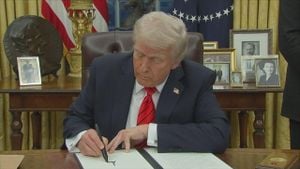U.S.-China economic and trade tensions have escalated significantly over the past few years, prompting various responses from key political figures and economists. The latest move involves Mexico, as it considers the implementation of strategies aimed at reducing reliance on Chinese imports. This development has emerged at the intersection of trade negotiations and geopolitical dynamics, drawing attention from both the U.S. and Canada.
At the heart of this discussion is Economy Minister Marcelo Ebrard, who recently proposed the idea of creating a North American 'Plan B' to counter the challenges posed by Chinese imports. Speaking at a meeting with BBVA bank officials on the sunny shores of Cancún, Ebrard expressed concerns about North America's dwindling competitiveness compared to China. He noted, "Maybe Mexico can put [a plan] on the table — not be on the defensive but propose it," emphasizing the need to formulate strategies to boost domestic production and lessen dependence on foreign exports.
Ebrard highlighted the need for greater collaboration among the U.S., Canada, and Mexico, stating, ". . . we haven’t had a plan B," when it came to dealing with economic pressures from China. With the U.S. having passed the Inflation Reduction Act — which provides substantial incentives for electric vehicle production — Mexico’s lower tariffs on Chinese goods, such as electric vehicles, have sparked debate. Currently, the U.S. and Canada impose hefty tariffs of 100% on many Chinese imports, whereas Mexico’s tariffs stand at only 20%, raising concerns about it becoming a backdoor for low-cost Chinese products.
This sentiment was echoed by Ontario Premier Doug Ford, who recently warned, "... if Mexico won’t fight transshipment by, at the very least, matching Canadian and American tariffs on Chinese imports, it should not be part of the North American free trade bloc." It remains unclear how Mexico might balance these tensions, especially with President Claudia Sheinbaum denying claims of Mexico being merely a transshipment hub for Chinese goods.
Trade dynamics between Mexico and the Asian powerhouse go far beyond electric vehicles. Recent discussions have also focused on semiconductor initiatives, which aim to fortify and expand Mexico's semiconductor sector. This collaboration appears to be part of Mexico's broader strategy to replace imports from China and other Asian nations with local production. According to Deputy Economy Minister for Foreign Trade, Luis Rosendo Gutiérrez Romano, the Mexican government is focused on encouraging U.S. automakers and tech companies to shift their sourcing strategies to reduce dependencies on goods manufactured overseas.
Simultaneously, the topic of economic security has reached the U.S. legislative floors. A bipartisan effort resulting in the introduction of the China Financial Threat Mitigation Act of 2024 signals the seriousness with which policymakers are viewing threats from China. Spearheaded by Senators Mark Warner, Mike Rounds, and Cynthia Lummis, this piece of legislation calls for comprehensive analyses of potential financial threats posed by the Chinese Communist Party (CCP) to the U.S. economy.
Warner, one of the act's proponents, underscored the growing aggressiveness shown by the Chinese government, asserting, "This bipartisan legislation takes the first step toward ensuring the U.S. is prepared to counter the threat posed by the CCP by shoring up our financial systems." He highlighted the risks infiltrated through multiple avenues, such as fluctuated exchange rates and the integration of Chinese equities within international investment indexes.
According to the findings from the U.S.-China Economic and Security Review Commission, uncertainties surrounding China's banking system could have significant repercussions on American investments. Risk factors indicate potential vulnerabilities as Chinese operations manipulate economic outcomes on various fronts, raising alarm bells for U.S. investors.
Concerns are growling within economic circles too about risks associated with the CCP’s influence over China’s financial sector. The bipartisan act urges federal authorities, including the U.S. Department of Treasury, to develop strategies against anticipated risks, aiming to bolster international cooperation and maintain national interests.
While these legislative moves are set against the backdrop of pressing economic realities, Mexico's proposed 'Plan B' signifies its intention to navigate the turbulent waters of global trade by strategically aligning with its North American partners. The crux of the matter still focuses on tangible steps needed to restructure current trade relationships. Would uniform tariffs on Chinese imports be the way forward? Or should additional partnerships bolster North America's production capabilities and circumvent the economic leverage held by China?
Interestingly, the common thread running through these discussions is the collaboration between countries sharing geographic proximity and economic dependency. Ahead of upcoming assessments of the United States-Mexico-Canada Agreement (USMCA) set for 2026, the stakes continue to rise as both nations seek to strengthen their economic resilience.
Mazimizing competitive advantage, without being solely reactive, seems to be on Ebrard's agenda. His conclusion is clear: any solution for North America should capitalize on its collective strength, urging each nation to proactively innovate solutions rather than passively follow individual national interests.
Against this backdrop, the reality remains: as economic interdependence intensifies, so too does the need for cohesive action among neighboring nations. The challenge lies not only within the political framework but also within the spheres of business, manufacturing, and trade, where strategies to balance external economic pressures and internal production revitalization will determine the future of North America's standing as competitive forces against the likes of China.



